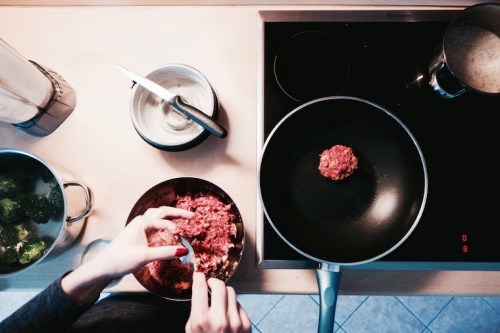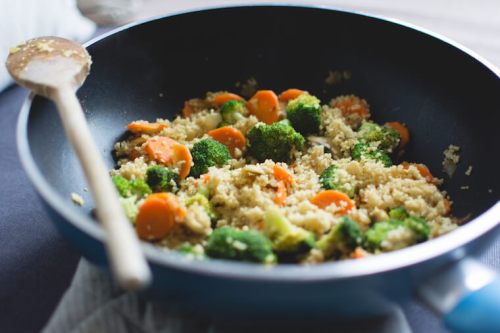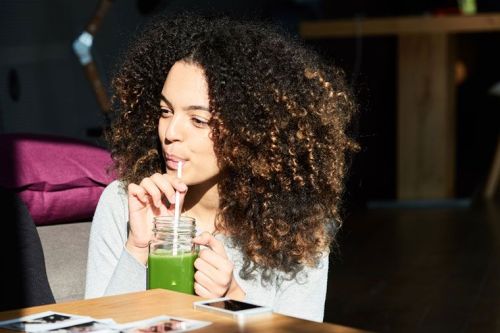Our editors independently select these products. Making a purchase through our links may earn Well+Good a commission
If you love a good sweat, you’re probably all about lean protein to keep your muscles strong. But there’s a connection between the macronutrient and sugar you might not know about—here, Kimberly Snyder, celeb nutritionist and Wellness Council member, explains the relationship between the two, how to tell if yours is healthy, and what to do if it’s not.
People want to make “smart” food choices, so they shun all carbohydrates (often even fruit) and err on the side of protein. Think Greek yogurt in the morning, a big helping of chicken on salad at lunch, and a large serving of fish or more poultry at dinner. I see it all the time—in my work, at parties, in restaurants, even the grocery store (yes, I do scope out everyone’s carts, can’t help myself).
Here’s the problem: Believe it or not, there’s a point where you can have too much of the dietary staple—and a protein detox (AKA a protox) may be in order.
If you eat more protein than your body needs, it will convert the excess into sugar (and then fat).
Why? Simply put, if you eat more protein than your body needs, it will convert the excess into sugar (and then fat), according to several studies (this one focused on whey protein).
This extra blood sugar circulating in your system doesn’t just add up to weight gain; it can also contribute to gut imbalances like candida. So if you’ve given up cupcakes and other sweets to maintain a healthy microbiome—but aren’t aware that excess protein is essentially sugar—then you may be missing the real culprit in not-so-pleasant potential side effects like chronic bloating, acne, irritable bowel syndrome, spaciness, and not being able to lose excess weight.
Because high-protein diets have been popular for so long, I realize this may sound surprising—which is why I’m passionate about reversing some of the massive misinformation on protein, and want you to feel your very healthiest, most energetic, and beautiful for life.
Think you might need to go on a protox? Here’s how to figure out if it’s time to cut back.

It’s mostly about meat
Eating excess protein almost always happens from eating too much animal protein. Meat consumption has risen dramatically in the past century—far more than humans were ever eating before, and in my opinion, way more than we were ever designed to eat (even if our ancestors were omnivores). Fiber-rich plant proteins are difficult to overeat for the most part, and especially to the extent we’re talking about.
But if you do consume too much of the macronutrient, excess sugar isn’t the only danger. The China Study, one of the most comprehensive nutrition research projects ever, found a strong correlation between high protein intake and cancer growth.
Eating excess protein almost always happens from eating too much animal protein.
Another key thing to remember is that a surplus of protein creates excessive nitrogen wastes, putting extra pressure on a person’s kidneys and stressing her liver, which is the body’s main detoxifying organ. With age, toxic overload can build up—and the additional waste that accumulates in your body can lead to the leaching of important minerals out of your bones (such as calcium).
And finally: Chronic dehydration is yet another issue that can result from relying heavily on your go-to chicken breast. (BTW, without enough water in your system, you’re more likely to get dry skin that wrinkles faster and hair that doesn’t grow in thick and healthy.)

So, how much protein should you eat?
The average woman only needs about 46 grams of protein per day. For instance, a cup of lentils has around 18 grams, and a cup of cooked spinach has around 5 grams.
Brussels sprouts, mushrooms—you name it, all whole foods contain protein-building amino acids that are easily assimilated into your body. If you’re eating a wide variety of plant foods and whole foods in general, you’ll get more than enough of your daily requirements.
Of course, you don’t have to be totally vegan or vegetarian—but if you are an omnivore, be cognizant of portion size. (I’d advise limiting animal protein to a few times a week or, at the most, once a day, getting the rest of your protein from plant foods.)

Opt for a balanced meal plan
The best way to go is a balanced approach, remembering that all three macronutrients—fat, carbs, and protein—should be part of your daily diet (and none demonized nor over-emphasized).
That’s the path to staying healthy, energetic, and beautiful from the inside out.
MorningHot water with lemon: 0 grams16 oz. Glowing Green Smoothie: 6 gramsSteel cut oatmeal (1/4 cup dry) made with water: 4 grams
LunchLarge kale salad with veggies: 13 gramsGorilla Collard Green Wraps: 11 grams
SnackChia pudding, 1 serving: 5 grams
Dinner1 cup of cooked quinoa with 1 cup of broccoli: 11 grams1 oz. dark chocolate (at least 72 percent cacao): 2 grams
Total: 52 grams of protein
With these meals, you can see how easy it is get far more than the average daily protein requirements for women with a plant-based diet. For men, larger portion sizes or some extra nuts and seeds would also easily help them hit the mark.
Power up!
 Kimberly Snyder, CN, is a member of the Well+Good Wellness Council, our handpicked holistic health squad that gives the best advice this side of your own personal guru.
Kimberly Snyder, CN, is a member of the Well+Good Wellness Council, our handpicked holistic health squad that gives the best advice this side of your own personal guru.
She’s also a celebrity nutritionist and the New York Times best‐selling author of The Beauty Detox Solution, The Beauty Detox Foods and The Beauty Detox Power, and co-author of Radical Beauty, with Deepak Chopra. Her popular beauty blog, KimberlySnyder.com, features Ayurveda-inspired recipes and products—and she’s also the creator of Glow Bio, an organic juice, smoothie, and cleanse company.
What should Kimberly write about next? Send your questions and suggestions to [email protected].
Sign Up for Our Daily Newsletter
Get all the latest in wellness, trends, food, fitness, beauty, and more delivered right to your inbox.
Got it, you've been added to our email list.











